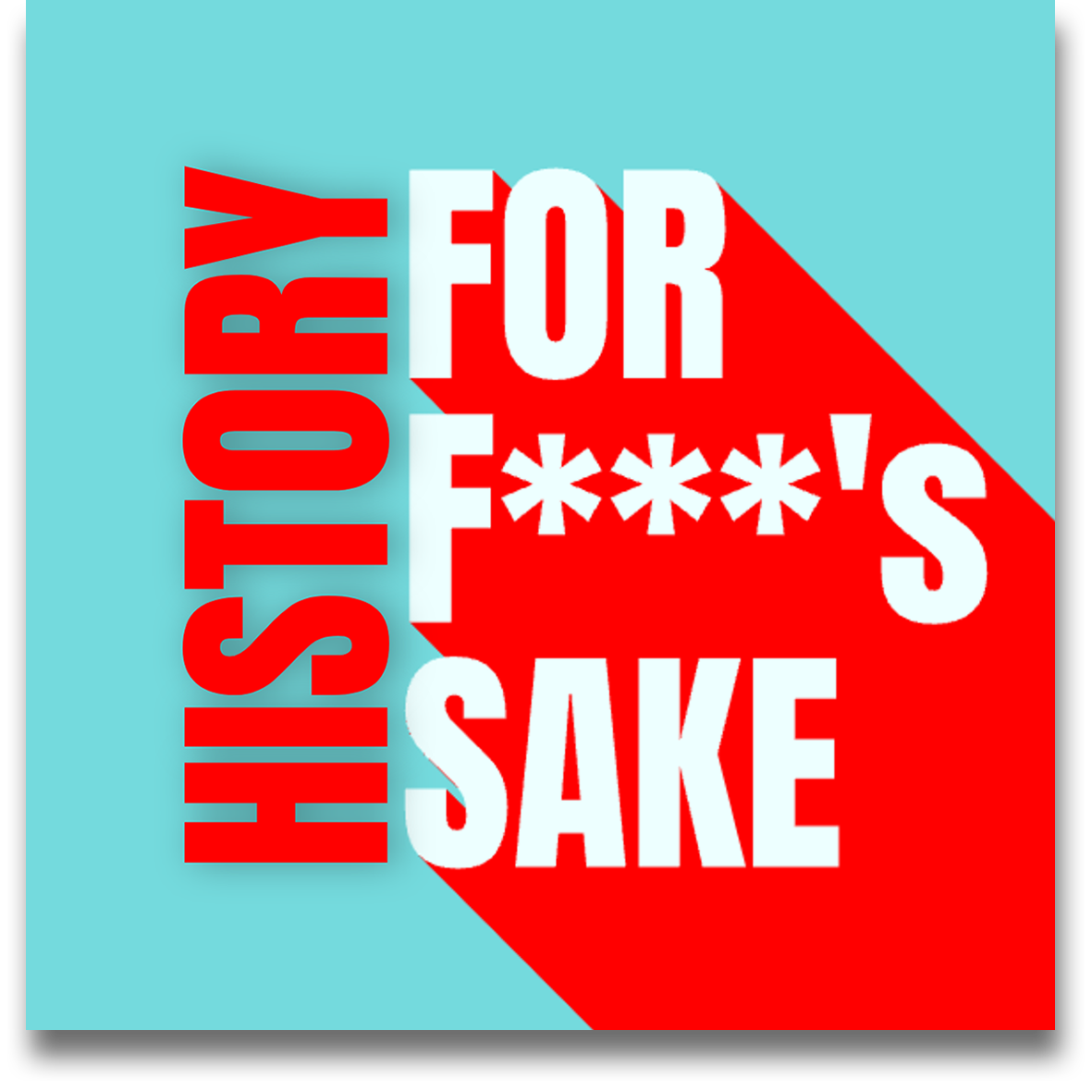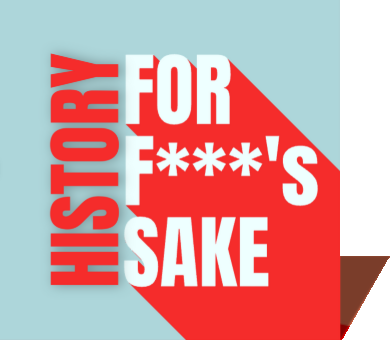The Resonance of History: Searching for the Lost Cello with Dr. Kate Kennedy

Did you ever wonder how we got here, and how sometimes tiny pieces of history make up, and have shaped our lives?
Or realised how every day, all of us are making history?
Join me, Sarah Dowd, in exploring what has happened in the everyday lives of people for the better, or at least the experiences that have just make us laugh and say…
This is… History. For F***’s Sake, the podcast that explores untold stories that make a difference.
When the world seemingly shut down for almost two years, what were we doing? We were creating art, making history and crying out of human contact. We were craving our culture.
I’m your host, Sarah Dowd, and I have worked on over 200 history, heritage and arts projects in the last 20 years across the world, everywhere from the Imperial War Museum in London to exploring how we put a fleet of ships in the sky, or bringing wrecks back from Honolulu.
I was recently diagnosed with ADHD which has brought a whole new layer of thinking about creativity and how we get people – ALL PEOPLE – really engaged with our shared history and culture.
Stories. Art. Film. Books. Ships. Music. Museums. People. Joy. Experiences. Humour. Humanity.
Because it’s all History, For F***’s Sake.
Find out more at historyffs.com
What connects a 300-year-old cello, a lost concerto, and the darkest chapters of 20th-century Europe? In this first ever episode of History for F***’s Sake, acclaimed author, BBC Radio 3 presenter, documentary maker, and cellist Dr. Kate Kennedy joins host Sarah Dowd to unravel the extraordinary true story at the heart of her acclaimed book, Cello: A Journey through Silence to Sound.
Kate has traced the journey of the missing cello belonging to Hungarian Jewish cellist Pal Hermann, lost for over 70 years after he was murdered during the Holocaust. Kate’s search took her across post-pandemic Europe, through cathedrals, Berlin streets, and sites of unimaginable suffering, ultimately weaving together her own fractured identity as a musician with those of others whose lives were shaped or shattered by history.
In this episode, Kate shares the human impact of finding the “unfindable” from the moment a chance message reunited Hermann’s daughter (and Europe) with her father’s long-lost cello, to the role of music, objects, and storytelling in keeping history alive.
Highlights:
- The journey from Wells Cathedral School to the stages of Europe, and how a teenage injury changed Kate’s artistic path
- What it’s like to seek an object haunted by the Holocaust
- The extraordinary reunion of Pal Hermann’s cello with his daughter at Wigmore Hall and what happens next for the instrument’s story
- The emotional tightrope of writing living history, from biographer’s ethics to working hand-in-hand with Holocaust survivors
- Exploring the profound connection between musicians and their instruments
- How cathedrals and museums can use music and storytelling to connect, not exclude, audiences today.
Spotify / Apple Music Playlists for this episode:
About Dr. Kate Kennedy
Kate Kennedy is an award-winning biographer, broadcaster, cellist, and Director of the Oxford Centre for Life Writing and the Museum of Music History. She’s the author of Cello: A Journey through Silence to Sound, which was named BBC Music Magazine’s Book of the Month, and a passionate advocate for making stories from the past resonate for new generations.
Kate’s work spans research into lost and silenced voices from composers erased by persecution to the overlooked contributions of women in music, and the secret histories waiting in boxes of dusty manuscripts.
Connect with Kate:
Website: https://drkatekennedy.com/
Oxford Centre for Life Writing: https://oclw.web.ox.ac.uk/home
X: @DrKKennedy
Insta:@drkatekennedy
BlueSky: @drkkennedy.bsky.social
About Sarah Dowd:
I’m Sarah Dowd – writer, speaker, heritage and arts consultant, producer, and all-around nerd – here to share the stories of our past that make us laugh, gasp, and mutter: It’s History… For F***k’s Sake.
For 25+ years I’ve created immersive, inclusive experiences that bring history alive, from rallying Second World War convoys through London to staging performances between Pearly Kings and Gen Z creatives. My work spans museums, cathedral crypts, pop-up theatres, global brands, and community projects across the UK and beyond.
As a Canadian living between the UK and France (with a late ADHD diagnosis that fuels my curiosity and creativity), I zigzag through culture, history, and big ideas, but never boring ones.
Every week on HistoryFFS, we explore how history echoes through today, from Drag Race to prefab tiny houses, with voices from musicians to mischief-makers.
Follow @HistoryFFS – because we’re all making history, one ridiculous, wonderful moment at a time.
Connect with Sarah:
Website:www.historyffs.com
LinkedIn:https://www.linkedin.com/in/sarahdowd/
Patreon: HistoryFFS
YouTube: @HistoryFFSPod
Instagram: @historyFFSPod
TikTok: @historyffspod
Produced by: winteraudio.co.uk
Follow the show for new episodes exploring the objects, people, and moments that shaped our world. If you want the story AND the sound of the past, this is essential listening.

To mark the 80th anniversary of Europe’s liberation from the concentration camps, and the first ever episode History for F***’s Sake welcomes Dr. Kate Kennedy, BBC Presenter, author, and director of the Oxford Life Writing Centre. In a fascinating conversation with host Sarah Dowd, Kate embarks on a deeply personal and historical journey: a quest to find one man’s missing cello, lost for decades amidst a backdrop of war, identity, and the power of objects to bridge centuries.
How it all Started
Kate’s romance with the cello began serendipitously when a headmaster, noting that a cello resembled a sideways guitar, placed one in her hands. She quickly became immersed in music, earning a government scholarship to the prestigious Wells Cathedral School. But her ascendant path was abruptly challenged by a devastating arm injury as a teenager, fracturing her sense of identity: “The cello’s always been my shadow, my silhouette… a complicated identity that I could never quite own.” Unable to play as she once did, Kate redirected her love of music into writing, research, and storytelling, a transformation that would underpin her future work.
The Search for a Lost Cello
Kate’s project became more than a search for an instrument; it was a pilgrimage through personal and collective memory. Traveling post-pandemic Europe, she played Bach in unlikely places from city streets to concert halls seeking “to build a constellation of voices” around the cello and its history. The effort to unravel the fate of Hungarian-Jewish cellist Paul Hermann’s Galliano cello became especially poignant. Saved at great risk from Nazi confiscation, the cello vanished in the 1950s, its location unknown until a remarkable twist after Kate’s book release, when a Chinese cellist on the other side of the world helped trace it to an Australian performer. This emotional discovery brought Paul Hermann’s legacy to life and reunited his daughter Corrie, after a lifetime apart, with the sound of her father’s instrument.
How History shapes the Present and the Future
A defining moment occurred as Kate stood in Lithuania’s Fort of Death on the day of Russia’s 2022 invasion of Ukraine. Engaged in urgent discussions about historical atrocity and contemporary threat, Kate experienced history as an unbroken continuum: “The urgency with which these stories need to be told… it is in order to shape the present and the future that we hold the past with us.” Her presence in such a place, in a moment of crisis, underscored history’s persistent relevance and the need to transmit its lessons both personally and universally.
The Cello as Human Connection
What makes the cello so resonant, as both an object and a metaphor? Its very shape and sound echo the human body and voice: “The cello is the only instrument that holds the full range of the human voice… it is the size of the human torso.” For cellists and listeners alike, it becomes a vessel for emotion, memory, and identity. Kate’s approach using the cello to physically and metaphorically carry stories across generations exemplifies the power of object biography to connect us all.
Life Writing and Ethical Storytelling
As a biographer and director of the Oxford Centre for Life Writing, Kate reflected on the ethical challenges of representing real lives, especially those who endured the Holocaust or whose descendants remain. Navigating consent, sensitivity, and accuracy is paramount, especially when handing a narrative “back to someone and say, was this you? Is this how you remember it?” Her account of vulnerable moments such as sharing manuscript drafts with living relatives underscored the intimacy and responsibility involved in mediating history.
Cathedrals, Community, and the Power of Storytelling
Kate champions the importance of tradition and inclusivity in engaging audiences with music and history. Cathedrals, she suggests, should not discard rituals, but rather invite newcomers by storytelling framing music and heritage as accessible and personally meaningful. As she puts it, “the power of storytelling… if we know the story… it’s infinitely more meaningful.”
Making History Real and Relatable
The episode closes with reflections on legacy, impact, and the impossibility of separating past from present. Kate’s efforts to recover silenced voices, shed light on lost cultural treasures, and promote empathy through art embody the living spirit of history. As Sarah observes, “History is our stories… what happened 100 years ago, and it’s the thing that makes us human beings.”
Dr. Kate Kennedy’s journey through music, memory, and loss reveals how art and storytelling can share a new side of history, and inspire new generations to learn.
Listen to the full episode of History for F***’s Sake for more on Kate Kennedy’s remarkable search.


